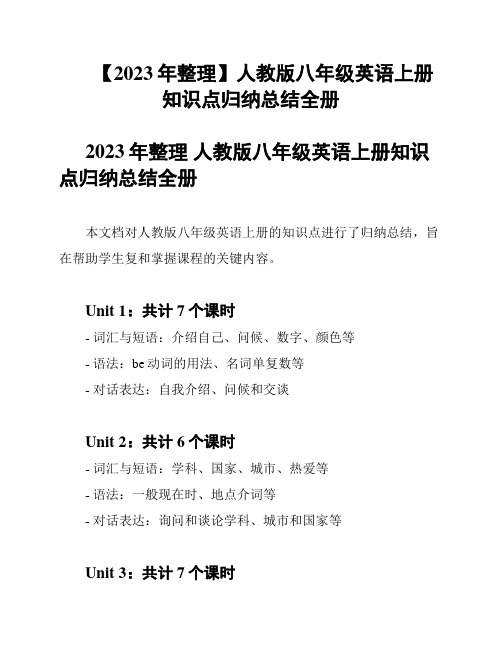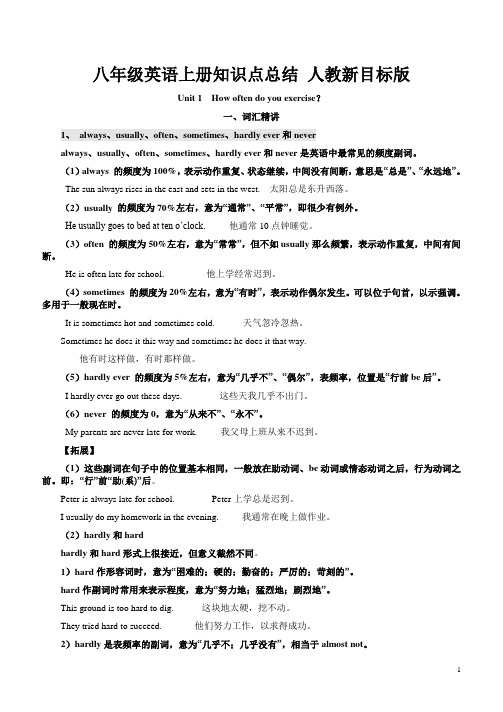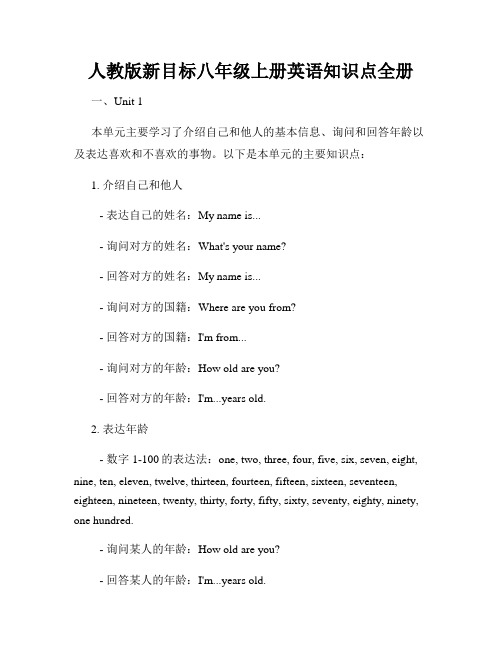完整版)人教版八年级英语上册单元知识点归纳
人教版八年级英语上册单元知识点归纳

人教版八年级英语上册单元知识点归纳Unit 1: Greetings and Introductions1. Greetings and expressions of politeness:- Hello, Hi, Good morning, Good afternoon, Good evening- How are you? I'm fine, thank you. And you?- Nice to meet you, Nice to see you- What's your name? My name is...2. Introducing oneself and others:- This is... (introducing someone)- May I introduce myself? (self-introduction)- Let me introduce myself. (self-introduction)3. Asking and giving personal information:- Where are you from? I'm from...- How old are you? I'm... years old.- What's your telephone number? It's...- What's your email address? It's...4. Expressing likes and dislikes:- I like... / I don't like...- What's your favorite...? My favorite... is...Unit 2: School Life1. School subjects and activities:- English, Math, Science, History, Geography, etc.- Study, do homework, take notes, listen to the teacher, read a book, etc.2. Talking about schedules and routines:- What time do you have...?- I have... (subject) at... (time).3. Class rules and instructions:- Raise your hand, ask a question, answer a question, etc.- Be on time, be polite, listen carefully, etc.4. Expressing preferences and abilities:- I prefer... over...- I'm good at... / I'm not good at...Unit 3: Hobbies and Interests1. Talking about hobbies and leisure activities:- I like playing soccer, swimming, reading, etc.- On the weekend, I enjoy...2. Expressing frequency:- How often do you...? I... (frequency: always, usually, often, sometimes, rarely, never).3. Making invitations and plans:- Would you like to...? Yes, I'd love to. / No, thank you.4. Expressing opinions and giving reasons:- In my opinion... / I think that... / Because...Unit 4: Daily Life1. Describing daily routines and activities:- I wake up, brush my teeth, have breakfast, etc.- I usually... / I often...2. Talking about family members and relationships:- My family consists of... (family members)- My... (family member) is...3. Describing locations and directions:- Where is...? It's... (location)- Go straight, turn left/right, etc.4. Talking about daily activities and habits:- After school, I... / Before going to bed, I...Unit 5: Food and Health1. Describing food and drinks:- I like eating... / I don't like... / It tastes...2. Talking about healthy habits:- It's important to eat fruits and vegetables.- Exercise regularly and get enough sleep.3. Expressing preferences and reasons:- I prefer... because...- I think... is better than...4. Discussing food and health issues:- What's your favorite food? Why?- Do you think fast food is healthy? Why or why not? (Continued in next message)。
【2023年整理】人教版八年级英语上册知识点归纳总结全册

【2023年整理】人教版八年级英语上册知识点归纳总结全册2023年整理人教版八年级英语上册知识点归纳总结全册本文档对人教版八年级英语上册的知识点进行了归纳总结,旨在帮助学生复和掌握课程的关键内容。
Unit 1:共计7个课时- 词汇与短语:介绍自己、问候、数字、颜色等- 语法:be动词的用法、名词单复数等- 对话表达:自我介绍、问候和交谈Unit 2:共计6个课时- 词汇与短语:学科、国家、城市、热爱等- 语法:一般现在时、地点介词等- 对话表达:询问和谈论学科、城市和国家等Unit 3:共计7个课时- 词汇与短语:家庭成员、描述人的性格、外貌等- 语法:形容词和副词的比较等- 对话表达:询问和描述家庭成员、性格和外貌等Unit 4:共计7个课时- 词汇与短语:时间、活动、运动等- 语法:动词的一般现在时、日常活动的表达等- 对话表达:询问和描述日常活动、时间和运动等Unit 5:共计7个课时- 词汇与短语:食物、饮料、购物等- 语法:can和can't表达能力等- 对话表达:订餐和购物等Unit 6:共计7个课时- 词汇与短语:学科、职业、梦想等- 语法:一般将来时和be going to等- 对话表达:谈论学科、职业和未来梦想等Unit 7:共计7个课时- 词汇与短语:天气、季节、假期等- 语法:现在进行时等- 对话表达:询问和描述天气、季节和假期等Unit 8:共计6个课时- 词汇与短语:旅行、交通工具、地点等- 语法:地点介词、现在进行时等- 对话表达:询问和描述旅行、交通工具和地点等以上为本文档的简要总结,根据课程内容进行了归纳,适合作为八年级英语上册的复辅助材料。
注意:本文档内容仅供参考,请以教材为准。
英语人教版八年级上册各单元知识点

英语人教版八年级上册各单元知识点人教版八年级上册英语单元词组及搭配Unit1 Where did you go on vacation?词组go on vacation去度假stay at home待在家里go to the mountains去爬山go to the beach去海滩visit museums参观博物馆go to summer camp去参观夏令营quite a few相当多study for为……而研究go out出去most of the time大部分时间taste good尝起来很好吃have a good time玩得高兴of course当然feel like 给……的感觉;感受到go shopping去购物in the past在过去walk around四处走走because of因为one bowl of…一碗……the next day第二天drink tea喝茶find out找出;查明go on继续take photos照相something important重要的事up and down上上下下come up出来搭配buy sth. for sb. / buy sb. sth.为某人买某物taste + adj.尝起来……look+adj.看起来……nothing…but+动词真相除……之外甚么都没有seem+(to be)+ adj.看起来……arrive in+大地址/ arrive at+小地址抵达某地decide to do sth.决意去做某事try doing sth.尝试做某事/ try to do sth.尽力去做某事forget doing sth.忘记做过某事/ forget to do sth.忘记做某事enjoy doing sth.喜欢做某事want to do sth.想去做某事start doing sth.开始做某事stop doing sth.停止做某事dislike doing sth.不喜欢做某事keep doing sth.继续做某事Why not do. sth.?为什么不做……呢?so+adj.+that+从句如此……以至于……tell sb. (not) to do sth.告诉某人(不要)做某事语法:不定代词和一般过去时态Unit2 How often do you exercise?词组help with housework帮助做家务on weekends在周末how often多久一次hardly ever几乎从不once a week每周一次twice a month每月两次every day每天be free有空go to the movies去看电影use the Internet用互联网swing dance摇摆舞play tennis打网球stay up late熬夜;睡得很晚at least至少have dance and piano lessons上舞蹈课和钢琴课go tobed early早点睡觉play sports进行体育活动be good for对……有好处go camping去野营not…at all一点儿也不……in one’s free time在某人的业余时间the most popular最受欢迎的such as比如;诸如old habits die hard积习难改go to the dentist去看牙医morn than多于;跨越less than少于搭配want sb. to do sth.想让某人做某事How many+可数名词复数+一般疑问句?……有多少……?主语+find+that从句.……发现……spend time with sb.和某人一起度过时光It’s+ adj.+ to do sth.做某事的……的。
人教版八年级英语上册知识点总结(全)

八年级英语上册知识点总结人教新目标版Unit 1 How often do you exercise?一、词汇精讲1、always、usually、often、sometimes、hardly ever和neveralways、usually、often、sometimes、hardly ever和never是英语中最常见的频度副词。
(1)always 的频度为100%,表示动作重复、状态继续,中间没有间断,意思是“总是”、“永远地”。
The sun always rises in the east and sets in the west. 太阳总是东升西落。
(2)usually 的频度为70%左右,意为“通常”、“平常”,即很少有例外。
He usually goes to bed at ten o’clock. 他通常10点钟睡觉。
(3)often 的频度为50%左右,意为“常常”,但不如usually那么频繁,表示动作重复,中间有间断。
He is often late for school. 他上学经常迟到。
(4)sometimes 的频度为20%左右,意为“有时”,表示动作偶尔发生。
可以位于句首,以示强调。
多用于一般现在时。
It is sometimes hot and sometimes cold. 天气忽冷忽热。
Sometimes he does it this way and sometimes he does it that way.他有时这样做,有时那样做。
(5)hardly ever 的频度为5%左右,意为“几乎不”、“偶尔”,表频率,位置是“行前be后”。
I hardly ever go out these days. 这些天我几乎不出门。
(6)never 的频度为0,意为“从来不”、“永不”。
My parents are never late for work. 我父母上班从来不迟到。
人教版八年级英语上册知识点总结

人教版八年级英语上册知识点总结人教版八年级英语上册知识点句子成分和类型1.主语:句子所陈述的对象。
2.谓语:主语发出的动作。
一般是有动作意义的动词。
3.宾语:分为动词宾语和介词宾语,属于动作的承受者。
4.系动词:表示状态或状态变化的动词,没有实际的动作意义。
如 be,感官系动词(look, sound, smell, taste 和 feel)、保持类系动词(keep,stay 和 remain)、状态变化类系动词(become、get、turn 和 go)等。
5.表语:紧跟系动词后面的成分。
6.定语:修饰名词或代词的成分。
7.状语:修饰形容词、副词、动词或句子的成分。
8.补语:分为宾语补足语和主语补足语。
是对宾语和主语的补充说明,与其有主动或被动的逻辑关系。
例如:You should keep the room clean and tidy.你应该让屋子保持干净整洁。
(You是主语, should keep是谓语,the room是宾语,clean and tidy是宾语补足语。
)This kind of food tastes delicious.这种食物吃起来很可口。
(This kind of food是主语, tastes是系动词, delicious是表语。
)注意:主语、谓语、宾语、系动词、表语、补语是一个句子的主干成分;定语和状语是一个句子的修饰性成分,不是主干成分。
9.简单句的基本形式是由一个主语加一个谓语构成。
10.复合句由一个主句和一个或一个以上的从句构成。
11.两个或两个以上的简单句用并列连词连在一起构成的句子,叫做并列句,其基本结构是“简单句+并列连词+简单句”。
一般疑问句一、不用疑问词,但需要用yes或no回答的疑问句,叫一般疑问句。
句末用问号“?”。
一般疑问句的基本用法及结构一般疑问句用于对某一情况提出疑问,通常可用yes和no来回答,读时用升调。
其基本结构是“be / have / 助动词+主语+谓语(表语)”:Is he interested in going? 他有兴趣去吗?Have you ever been to Japan? 你到过日本吗?Does she often have colds? 她常常感冒吗?Did you ask her which to buy? 你问没问她该买哪一个?二、陈述句变一般疑问句的方法1.动词be的疑问式:动词be根据不同的时态和人称可以有am, is, are,was, were等不同形式,可用作连系动词(表示“是”、“在”等)和助动词(用于构成进行时态和被动语态等),但不管何种情况,构成疑问式时,一律将动词be的适当形式置于句首:句型:Be动词+主语~?Is your father angry?你父亲生气了吗?Yes,he is.是的,他生气了。
人教版八年级英语上册知识点

人教版八年级英语上册知识点(经典版)编制人:__________________审核人:__________________审批人:__________________编制单位:__________________编制时间:____年____月____日序言下载提示:该文档是本店铺精心编制而成的,希望大家下载后,能够帮助大家解决实际问题。
文档下载后可定制修改,请根据实际需要进行调整和使用,谢谢!并且,本店铺为大家提供各种类型的经典范文,如演讲稿、总结报告、合同协议、方案大全、工作计划、学习计划、条据书信、致辞讲话、教学资料、作文大全、其他范文等等,想了解不同范文格式和写法,敬请关注!Download tips: This document is carefully compiled by this editor. I hope that after you download it, it can help you solve practical problems. The document can be customized and modified after downloading, please adjust and use it according to actual needs, thank you!In addition, this shop provides you with various types of classic sample essays, such as speech drafts, summary reports, contract agreements, project plans, work plans, study plans, letter letters, speeches, teaching materials, essays, other sample essays, etc. Want to know the format and writing of different sample essays, so stay tuned!人教版八年级英语上册知识点还不清楚八年级英语知识点有哪些知识点的小伙伴们,赶紧和本店铺去瞧瞧吧!下面本店铺为大家带来人教版八年级英语上册知识点,欢迎大家参考阅读,希望能够帮助到大家!人教版八年级英语上册知识点句子成分和类型1.主语:句子所陈述的对象。
人教版新目标八年级上册英语知识点全册

人教版新目标八年级上册英语知识点全册一、Unit 1本单元主要学习了介绍自己和他人的基本信息、询问和回答年龄以及表达喜欢和不喜欢的事物。
以下是本单元的主要知识点:1. 介绍自己和他人- 表达自己的姓名:My name is...- 询问对方的姓名:What's your name?- 回答对方的姓名:My name is...- 询问对方的国籍:Where are you from?- 回答对方的国籍:I'm from...- 询问对方的年龄:How old are you?- 回答对方的年龄:I'm...years old.2. 表达年龄- 数字1-100的表达法:one, two, three, four, five, six, seven, eight, nine, ten, eleven, twelve, thirteen, fourteen, fifteen, sixteen, seventeen, eighteen, nineteen, twenty, thirty, forty, fifty, sixty, seventy, eighty, ninety, one hundred.- 询问某人的年龄:How old are you?- 回答某人的年龄:I'm...years old.3. 表达喜好和不喜好- 喜欢某物:like- 不喜欢某物:don't like- 例句:I like playing basketball. / He doesn't like swimming.二、Unit 2本单元主要学习了询问和指示方向的表达方式,以及介绍某地的位置。
以下是本单元的主要知识点:1. 询问和指示方向- 询问某地的位置:Where is...?- 表示某地的位置:It's...- 例句:Where is the library? It's next to the school.2. 介绍某地的位置- 表示在某地的具体位置:on, in, under, next to, between, behind, in front of.- 例句:The supermarket is next to the bank. / The school is between the hospital and the post office.三、Unit 3本单元主要学习了购物和描述物品的基本词汇和句型。
初中英语人教版八年级上册重点知识整理(1~3单元)

八年级英语上册重点知识整理Unit1 Where did you go on vacation?【重点语法】不定代词:不指名代替任何特定名词或形容词的代词叫做不定代词。
用法注意:1、some 和any+可数名/不可数名。
some 多用于肯定句,any多用于否定句、疑问句和条件从句。
有些问句中用some,不用any, 问话者希望得到对方肯定回答。
2、由some, any, no,every 与 body, one, thing构成的复合不定代词作主语时,其谓语动词用三单。
3、不定代词若有定语修饰,该定语要置于其后:如:something interesting【重点短语】1.buy sth for ab./ buy sb.sth 为某人买某物2.taste + adj.尝起来……3.nothing...but + V.(原形) 除了……之外什么都没有4.seem + (to be) + adj 看起来5.arrive in + 大地方 / arrive at + 小地方到达某地6.decide to do sth.决定做某事7.try doing sth.尝试做某事 / try to do sth.尽力做某事8.enjoy doing sth.喜欢做某事9.want to do sth.想去做某事10.start doing sth.开始做某事/ begin doing sth.11.stop doing sth.停止做某事区分:stop to do sth.停下来去做某事12.dislike doing sth.不喜欢做某事14.so + adj + that + 从句如此……以至于……16.tell sb.(not) to do sth.告诉某人(不要)做某事17.keep doing sth. 继续做某事18.forget to do sth.忘记去做某事 / forget doing sth 忘记做过某事【词语辨析】1.take a photo/ take photos 拍照2.seem + 形容词看起来…seem + to do sth.似乎/好像做某事It seems + 从句似乎..….It seems that no>seem like ...好像,似乎…3.arrive in +大地点= get to= reach+地点名“到达......”arrive at +小地点(注:若后跟地点副词here/there/home, 介词需省略,如:arrive here; get home)4.feel like sth 感觉像…feel doing sth.想要做某事5.wonder(想知道)+疑问词(who, what, why)引导的从句。
- 1、下载文档前请自行甄别文档内容的完整性,平台不提供额外的编辑、内容补充、找答案等附加服务。
- 2、"仅部分预览"的文档,不可在线预览部分如存在完整性等问题,可反馈申请退款(可完整预览的文档不适用该条件!)。
- 3、如文档侵犯您的权益,请联系客服反馈,我们会尽快为您处理(人工客服工作时间:9:00-18:30)。
完整版)人教版八年级英语上册单元知识点归纳Unit 1 Where Did You Go on n?In this unit。
we learn some XXX.1.Go on n – to take a n2.Stay at home – to remain at home3.Go to the mountains – to hike in the mountains4.Go to the beach – to spend time at the seaside5.Visit museums – XXX6.Go to summer camp – to attend a summer camp7.Quite a few – a considerable number8.Study for tests – to prepare for exams9.Go out – to leave home10.Most of the time – the majority of the time11.Have a good time doing – to enjoy oneself while doing something12.Of course – certainly13.Feel like – to have a desire for something14.Go shopping – to shop15.In the past – in us times16.Walk around – to strollWe also learn some grammar points:1.Buy sth。
for sb。
/ buy sb。
sth。
– to purchase something for someone2.XXX good – to have a good XXX3.XXX动词原形– nothing except4.Seem+(to be)+adj。
– to appear to be something5.Arrive in/at/get to/reach – to arrive at a n6.Decide to do sth。
– to make a n to do something.My nLast summer。
I went to Beijing for my XXX such as the Great Wall。
the Palace Museum。
Tian'anmen Square。
and Beijing hutongs。
The weather was hot and humid。
but it didn't。
me from enjoying my trip。
I tried different XXX activities。
XXX me to learn more about Chinese culture and history。
Overall。
I had a great time in Beijing and would XXX now!剔除下面文章的格式错误,删除明显有问题的段落,然后再小幅度的改写每段话。
How Often Do You Exercise?XXX for your health。
It can help you XXX。
But how often should you exercise?According to the American Heart n。
adults should aim for at least 150 minutes of moderate-intensity exercise or 75 minutes of vigorous-intensity exercise per week。
This can be broken down into 30 minutes of exercise。
five days a week。
XXX-XXX brisk walking。
cycling。
and swimming。
Vigorous-intensity exercise includes activities like running。
hiking。
and playing sports。
It'XXX two days a week。
This can include lifting weights。
using resistance bands。
or XXX push-ups and squats。
Remember。
any physical activity is better than none。
Even if you can't meet the mended guidelines。
XXX for your health。
Start small and gradually increase the amount and XXX。
In n。
aim for at least 150 minutes of moderate-intensity exercise or 75 minutes of vigorous-intensity exercise per week。
and include XXX two days a week。
Remember to start small and gradually increase your exercise routine.1.我经常帮助做家务,特别是在周末。
熬夜对身体不好,所以我通常早点睡觉。
2.我每周至少打一次网球,每月两次进行体育活动。
每天我都会在业余时间做一些事情,比如上摇摆舞课或者弹钢琴。
这有助于我保持身体健康,也让我更有乐趣。
3.我已经上了十年的舞蹈和钢琴课了。
我每周会上三到四次课,但我几乎从不熬夜。
我发现这些课程对我非常有帮助,让我在音乐和舞蹈领域有所进步。
4.我每周会打一次网球,但几乎不参加其他体育活动。
我通常会早点睡觉,因为我知道这对我的身体健康有好处。
5.我喜欢在业余时间做一些事情,比如去看电影或上野营。
我发现这些活动让我更加快乐和放松。
我不太喜欢在网上冲浪,因为我觉得这浪费时间。
According to the activity survey of Class 1.Grade 8.90% ofthe students do homework every day。
while only 10% of them doit once or twice a week。
80% of the students use the。
every day。
with the other 20% using it at least three or four times a week。
Most students use it for XXX playing sports。
the results are also interesting。
30% of the students play sports every day。
20% do it once or twice a week。
and 50% do it three or four times a week。
XXX the best way to stay active and healthy。
When asked about their favorite sport。
the majority of the students chose basketball。
It's great to see that the students are XXX.Old habits die hard。
and it's never too XXX three or four times a week to maintain good health.When comparing personalities。
we can use phrases like "XXX。
On the other hand。
we can use "not as XXX。
For example。
my sister is not as outgoing as I am。
XXX to care about others and take care of those close to us。
like a XXX。
In fact。
XXX grades and sharing everything can help us grow as XXX。
As long as we have the desire to learn。
anyone can be talented in music or any other field。
Whether we are primary or middle school students。
we can always seek n and resources。
like the English study center。
Some useful grammar points include the use of "make someone do something," expressing desires with "want to do something," and acknowledging that something may not be XXX." nally。
we can use "both" after a verb to XXX adverbs。
we use the comparative form with "than" to show differences.Most adjectives and adverbs have three degrees of comparison: 1) positive degree (not compared)。
used with modifiers such as very。
so。
too。
pretty。
quite。
really。
2) comparative degree。
indicating "more" or "less" (comparison een two things)。
indicated by words such as than。
